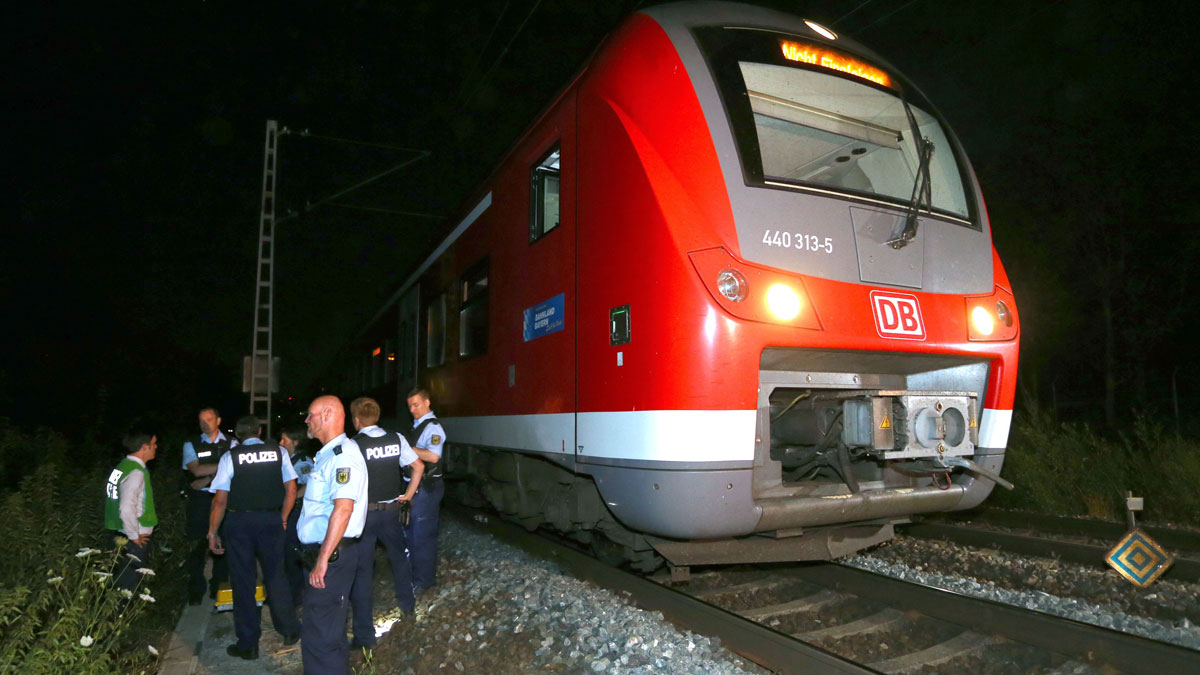German axe attack: Islamic State flag found in teenager's room
Seventeen-year-old refugee shot dead after seriously injuring three people on commuter train

A free daily email with the biggest news stories of the day – and the best features from TheWeek.com
You are now subscribed
Your newsletter sign-up was successful
A hand-painted Islamic State flag has been found in the bedroom of an Afghan teenager said to have carried out an axe and knife attack on a German train, officials say.
The 17-year-old injured four people, three of them seriously, on a regional commuter train travelling between the Bavarian towns of Treuchtlingen and Wurzburg on Monday night. He was shot dead by police, reports German news website Deutsche Welle.
Bavaria's interior minister, Joachim Herrmann, said the attacker was a 17-year-old asylum-seeker who had arrived in Germany as an unaccompanied minor and had been living with a foster family in Ochsenfurt, south of Wurzburg, for "a few months".
The Week
Escape your echo chamber. Get the facts behind the news, plus analysis from multiple perspectives.

Sign up for The Week's Free Newsletters
From our morning news briefing to a weekly Good News Newsletter, get the best of The Week delivered directly to your inbox.
From our morning news briefing to a weekly Good News Newsletter, get the best of The Week delivered directly to your inbox.
Herrmann told German television the flag had been found among the teenager's belongings in his room, but said it was too early to say whether he was a member of an Islamist group or had become self-radicalised.
One witness claims the youth shouted "Allahu akbar" ("God is great"), while the IS-linked Amaq news agency has said he was an IS "fighter", reports the BBC.
Local media reports in China have identified the victims as a group of tourists from Hong Kong.
According to the South China Morning Post, they are a married couple, their 27-year-old daughter and her 31-year-old boyfriend, all from Hong Kong. Their 17-year-old son travelling with them was not hurt, it said.
A free daily email with the biggest news stories of the day – and the best features from TheWeek.com
A source told the paper the father and boyfriend had tried to protect the other members of the group.
Germany initially welcomed refugees but has since begun to take a much tougher line, declaring it would deport Afghan asylum-seekers whose applications were rejected, reports The Guardian.
Afghans have been the second largest group to enter the European Union in recent months, with 178,230 seeking asylum in the EU's 28 states in 2015, adds the paper.
-
 Political cartoons for February 20
Political cartoons for February 20Cartoons Friday’s political cartoons include just the ice, winter games, and more
-
 Sepsis ‘breakthrough’: the world’s first targeted treatment?
Sepsis ‘breakthrough’: the world’s first targeted treatment?The Explainer New drug could reverse effects of sepsis, rather than trying to treat infection with antibiotics
-
 James Van Der Beek obituary: fresh-faced Dawson’s Creek star
James Van Der Beek obituary: fresh-faced Dawson’s Creek starIn The Spotlight Van Der Beek fronted one of the most successful teen dramas of the 90s – but his Dawson fame proved a double-edged sword
-
 Epstein files topple law CEO, roil UK government
Epstein files topple law CEO, roil UK governmentSpeed Read Peter Mandelson, Britain’s former ambassador to the US, is caught up in the scandal
-
 Iran and US prepare to meet after skirmishes
Iran and US prepare to meet after skirmishesSpeed Read The incident comes amid heightened tensions in the Middle East
-
 Israel retrieves final hostage’s body from Gaza
Israel retrieves final hostage’s body from GazaSpeed Read The 24-year-old police officer was killed during the initial Hamas attack
-
 China’s Xi targets top general in growing purge
China’s Xi targets top general in growing purgeSpeed Read Zhang Youxia is being investigated over ‘grave violations’ of the law
-
 Panama and Canada are negotiating over a crucial copper mine
Panama and Canada are negotiating over a crucial copper mineIn the Spotlight Panama is set to make a final decision on the mine this summer
-
 Why Greenland’s natural resources are nearly impossible to mine
Why Greenland’s natural resources are nearly impossible to mineThe Explainer The country’s natural landscape makes the task extremely difficult
-
 Iran cuts internet as protests escalate
Iran cuts internet as protests escalateSpeed Reada Government buildings across the country have been set on fire
-
 US nabs ‘shadow’ tanker claimed by Russia
US nabs ‘shadow’ tanker claimed by RussiaSpeed Read The ship was one of two vessels seized by the US military